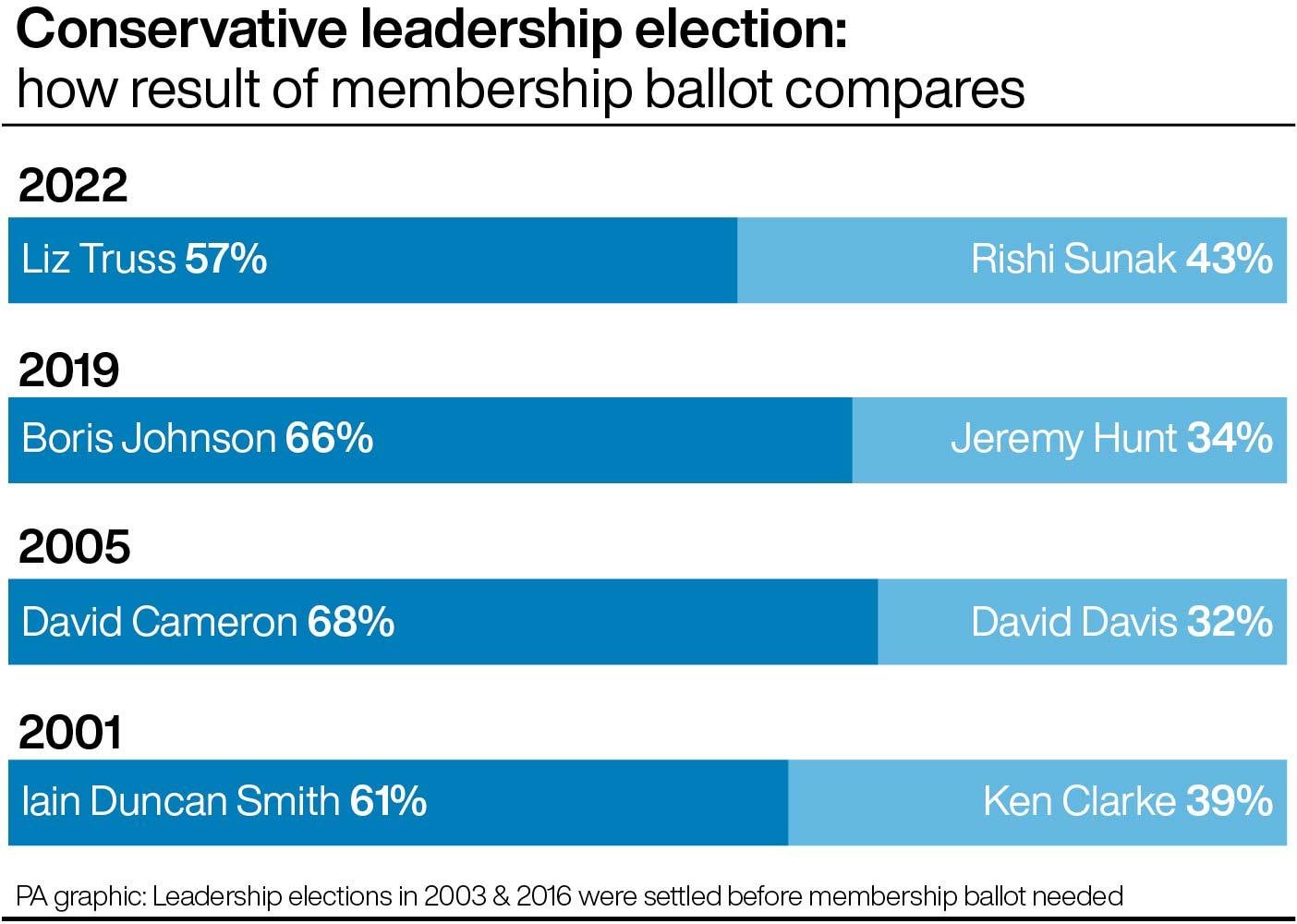
Liz Truss faces a battle to unite the Tory party after winning a smaller share of the membership vote than any of her predecessors as Conservative leader.
Outgoing Prime Minister Boris Johnson insisted his successor’s victory was “decisive”, as the Foreign Secretary picked up 57% of valid votes cast, compared to 43% for her rival Rishi Sunak.
However, when turnout is taken into consideration, less than half the Tory membership chose to vote for Ms Truss, while a greater number of Conservative MPs backed Mr Sunak, the former chancellor.
Ms Truss, who will take over in No 10 on Tuesday, vowed to “deliver a great victory” for the Tories in a 2024 general election and promised a “bold plan to cut taxes and grow our economy” as she delivered her victory speech.
While comfortable, the leadership margins hint at challenges in keeping a fractious Tory party behind her as she seeks to guide the UK through an economically perilous period that is hitting living standards.
Mr Johnson’s victory in the same contest in 2019 was far more decisive, picking up 66% of votes compared to Jeremy Hunt’s 34%.
David Cameron managed an even bigger share in 2005, winning 68% of votes to David Davis’s 32%.
Ms Truss also fell short of the total secured by Sir Iain Duncan Smith in 2001, who picked up 61% of votes versus Ken Clarke’s 39%.

In the two other leadership contests that have occurred under the current rules, in 2003 and 2016, the outcome was decided before a ballot of the membership could take place.
At Monday’s announcement, it emerged there are 172,437 Tory members who were eligible to vote in the contest and that 82.6% chose to take part.
Ms Truss received 81,326 votes, meaning that 47% of those who could have cast a vote in her favour chose to do so.
In 2019, Mr Johnson won 58% of the eligible membership’s support on a turnout of 87.4%.
Ms Truss’s victory also means this is the first Tory leadership contest since 2001 that the candidate with the most votes among MPs has not won the most votes among party members.
Mr Sunak led his rival candidates in every round of voting among MPs and ended up with 137 votes in the final ballot, ahead of Ms Truss on 113 and Penny Mordaunt, who was eliminated from the contest, on 105.
Boris Johnson and David Cameron both won the most votes among MPs and the party at large.
In 2001, Ken Clarke, now Lord Clarke, won the most votes among MPs but lost the ballot of members to Iain Duncan Smith.
On Monday, Mr Johnson tweeted his congratulations to Ms Truss over her “decisive win”, adding: “Now is the time for all Conservatives to get behind her 100 per cent.”
Penny Mordaunt, who came third in the first part of the leadership race to win the support of Tory MPs, told the PA news agency that Ms Truss had won a “good majority”.
She said the party must now “come together and get on and deliver for the people that we serve”.
Asked if she is confident the Tory party can now come back together, she said: “Yes, because we know we need to do that. We know we need to do that to deliver, to get things through the House of Commons.”
Steve Baker, who ultimately backed Ms Truss in the race, told PA he is “not concerned about the party uniting” because “we as politicians are in the business of disagreeing, finding compromise and moving forward together”, adding that “now’s not a time to mess about”.







